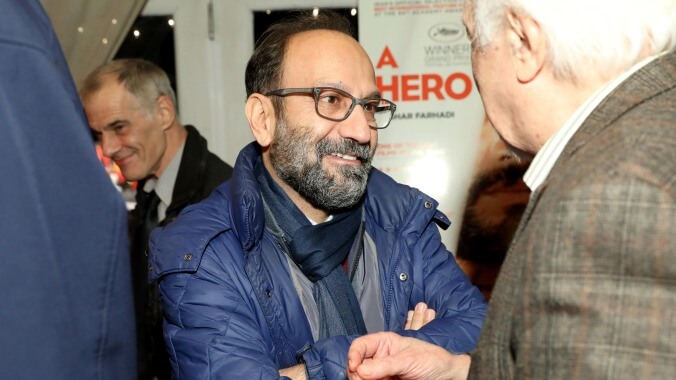UPDATE: Asghar Farhadi plagiarism case ruling not final despite reports, producer says
The Oscar-winning director's case is still going through the Iranian court system

Update, 4/6: The plagiarism case against Oscar-winner Asghar Farhadi continues to get more complicated. Despite reports from THR yesterday that the director had been found guilty of plagiarizing the idea for his film A Hero, sources now corroborate his lawyer’s previous claims and say the process is still ongoing.
The first court has reportedly only indicted Farhadi after finding what they believe is evidence of plagiarism. The case will now move to a second court where it will be evaluated and a judgement will be passed down. That ruling could still be appealed or the judge could order a re-evaluation of the case.
“We firmly believe that the court will dismiss Ms. Masihzadeh who cannot claim ownership on matters in the public domain given that the prisoner’s story has been disclosed in both press articles and TV reports years before Ms. Masihzadeh’s documentary was published,” Alexandre Mallet-Guy of Memento Production says in a statement.
“I think it is important to emphasize here that A Hero, like Asghar Farhadi’s other films, features complex situations where the lives of the characters are built upon one another,” he continues. “The story of this former prisoner finding gold in the street and giving it back to its owner is only the starting point of the plot of A Hero. The remaining is Asghar’s pure creation.”
Director Asghar Farhadi has been found guilty of plagiarism by an Iran court for lifting the concept of his film, A Hero, from a documentary made by one of his former students.
The Tehran court came to the decision that Farhadi violated the copyright of student Azadeh Masihzadeh, taking key elements of her documentary for A Hero without crediting Masihzadeh. The former student screened her documentary All Winners All Losers in his class in 2014 at the Karnameh Institute after finding the subject and crafting the story herself.
“While most of other characters that the rest of the students followed had already been interviewed by national TV or other media programs, Ms. Masihzadeh did all the research to find her story and character by herself and independently,” Negar Eskandarfar, the manager of Karnameh told ABC News.
Farhadi’s punishment will now be decided by a second judge but, per IndieWire, the director faces giving up “all income earned by the screening of the film in theaters or online” or even prison time. Masihzadeh has been deemed not guilty in a separate defamation case filed against her. If the court decided Masihzadeh was guilty of defaming Farhadi, she could have been subjected to 74 lashes and two years prison time.
It should be noted that while Masihzadeh did sign a document (which has been deemed meaningless) that “allowed” Farhadi to take credit for the concept of the documentary, Masihzadeh only filed the lawsuit against Farhadi after he filed the defamation lawsuit against her, accusing her of “spreading lies about him.”
The decision passed down by the Tehran court is reportedly binding and not up for appeal, with local reports stating the Tehran Culture and Media Court “has considered the documents and the reasons provided for the occurrence of the crime and its commission by Mr. Farhadi to be sufficient and has issued a final order to summon Mr. Farhadi to trial.” However, Farhadi’s lawyer, Kaveh Rad, took to Instagram to share that the verdict process is indeed still ongoing.
“The decision is not the final verdict of the court and is considered part of the trial process, and in the continuation of the trial process, the case will be reexamined first in the second criminal court and then in the appellate court,” Rad wrote (per Deadline).